Rethinking Education from First Principles
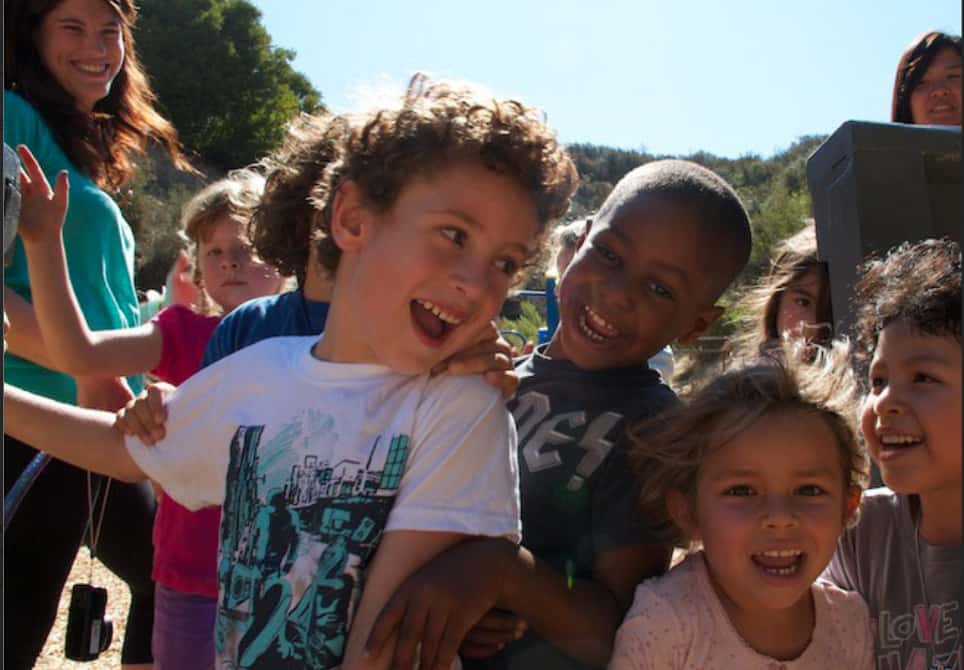
By Richard Boyd
“As to methods, there may be a million and then some but principles are few. The man who grasps principles can successfully select his own methods. The man who tries methods, ignoring principles, is sure to have trouble.”
–Ralph Waldo Emerson
Elon Musk, Alan Kay, Neil Postman, James Cameron, Seymour Papert and the future of American education.
This article is about people I admire greatly for the way they approach hard problems. It is also about one problem in particular that I admire, that may be the most profound and important question of this century. The question isn’t new, it has been addressed by many people over many decades and from every perspective.
What I am hoping to do here is explain why I am siding with certain thinkers and taking a first principles, clean sheet of paper metaphysical approach to the problem–and why you should too. The question is this:
How should we educate children to prepare them for the 21st Century?
- What skills will they need?
- What tools should they wield?
- What is the role of technology?
- What is the role of Teachers?
- What is the role of government? (And why do (or should) we publicly fund education?)
In 2012, while I was at Lockheed Martin, I led a group of people addressing the issue of American education from the perspective of national security. From the Aerospace and defense industry’s perspective, we were (and still are) not graduating enough qualified engineers to replace the silver tsunami of retiring engineers.
This is not a new phenomenon. The Federal government recognized the need to create engineers in 1958 when the Soviet Union launched Sputnik. The 1958 National Defense Education Act (NDEA) was passed in the recognition that America suffered from a shortage of mathematicians and scientists to compete with the Soviet Union in technology. The NDEA included support for loans to college students, the improvement of science, mathematics and foreign language instruction in elementary and secondary schools, graduate fellowships and vocational-technical training.
It wasn’t until 1980 that Congress established the Department of Education as a cabinet-level agency. In 2016 we will spend about $1.2 trillion on education, with nearly 11% coming from federal sources and the rest from state and local governments. Of this $1.2 trillion, the U.S. sets aside about $2.9 billion in R&D, mostly focused on STEM initiatives. This is about a quarter of a percent of expenditures. Approximately 12% of the Defense budget is dedicated to R&D.
Game Changer
While with Lockheed I was invited to a “Games for Change Conference” in New York. We held a special small session about the future of learning–specifically to discuss the idea of creating a federally funded research agency to address the R&D issues for transforming education. Jim Shelton was there from the Department of Education, along with Xerox Parc pioneer Alan Kay, pioneering thinkers from Sesame Street, Mitch Resnick from MIT and others.
While there I met Rebecca Amis, sister of Suzy Cameron, director James Cameron’s wife. She described a project she had put together with Suzy in Calabasas, CA to address these questions. They had launched a school, beginning with a clean sheet of paper and guided by the problem of how to go about creating people who grow up to “think like scientists and mathematicians and artists and poets at the same time, while also focusing on stewardship of the planet.“ I was immediately intrigued.
 The Muse School is the private school Rebecca and Suzy started in the hills above Malibu that takes that clean sheet, first principles approach to educating children. I visited the school as soon as I was able and joined the board of directors soon thereafter.
The Muse School is the private school Rebecca and Suzy started in the hills above Malibu that takes that clean sheet, first principles approach to educating children. I visited the school as soon as I was able and joined the board of directors soon thereafter.
The school started with 11 kindergarten and first grade kids (including some of the Camerons’ children) in 2005, and is now a two campus-and-growing environment serving K-12.A visit to a Muse Campus reveals right away how different the approach became.
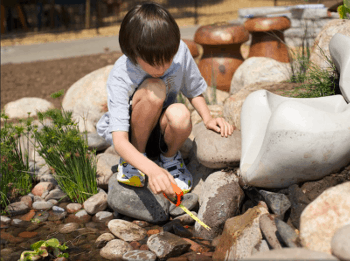
Textbooks are thrown out in favor of project-based learning designed around the passions of each student. The approach to technology at Muse follows the principle of personalized direction, and can be introduced as early as kindergarten for children who show interest, but is guided at all times by a teacher.
Muse encourages balance with tech, ensuring that students explore a wide range of resources including all media types as well as experience based-learning and maker labs and visits with subject matter experts either online or in lectures or site visits.

An evidence-based scientific method way of thinking is embedded in every student. The students grow and prepare food using the best evidence-based approaches and are encouraged to improve upon them. The school has unanimously adopted a vegan menu as a direct result of their evidence-based analysis of what is best for the environment as well as their own health.
Now in my fourth year on the board, I am completely sold on this approach to learning, and having difficulty containing my enthusiasm for spreading the message to others while also restraining my frustration with what I see happening in schools all over America today. Teaching children confidence, self-efficacy and the ability to think critically from a scientific, evidenced-based scaffolding is exactly the right foundation to build 21st century citizens of Earth.
“He or she who has a why to live can bear with almost any how.”
– Nietzche
While visiting the campus for a board meeting, I decided to call up my old friend Alan Kay who lives just down the beach near Marina Del Rey. We met at the Café Del Rey and I talked with him about what the Camerons were doing in Calabasas. While not necessarily agreeing with the vegan conclusion, he wholeheartedly agreed with the constructionist approach the Camerons are taking with Muse.
Constructionism is MIT computer scientist Seymour Papert’s take on Jean Piaget’s constructivism theories of learning. In constructionism, the teacher’s role changes from teaching “at” students to more of a mediational role, where projects are designed for hands on learning. It is especially good at teaching with the aid of computers. Papert worked with the Mind Storms project at Lego while he was at MIT and produced an excellent book on how children can learn with legos and computers: Mindstorms: Children, Computers, and Powerful Ideas.
Alan Kay also urged me to read Neil Postman’s book The End of Education, where Postman describes the engineering and metaphysical questions of why and how we should invest in education, and expounds on the adequacy of education for teaching before the information age dawned, but as being wholly inadequate today.
We also talked about Kay’s theory of human universals and non-universals, which he presented to the audience at the Games for Change conference where we met in 2012. In a pre-industrial age, the universals could be taught to children by parents or anyone. In fact, it is likely that children will arrive at universal truths on their own through life experience. These universals include things like basic language and communication as well as tool use, reacting to patterns and case-based learning.
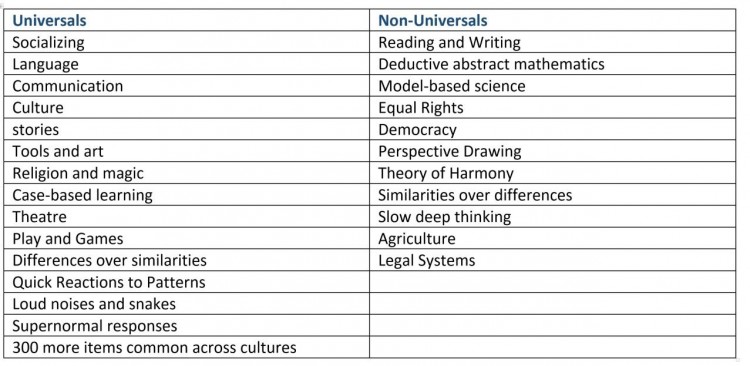
“What’s interesting is to look for things that are not universal, that seem to have some importance as well. Most people have lived and died on this Earth for 100,000 years without reading and writing, without having deductive math and model based science.”
“The non-universals are a little harder to learn because we are not directly wired to learn them. These things are actually inventions which are difficult to invent. And the rise of schools going all the way back to the Sumerian and Egyptian times came about to start helping children learn some of these things that aren’t easy to learn. It can be argued that if you are trying to be utopian about education, what we should be doing is helping the children of the world learn these hard-to-learn things. Equal rights is a really good one to help children learn. No culture in the world is particularly good at it.”
The non-universals are unnatural and abstract, emerging as models, tools and artifacts (with a nod to Douglas Engelbart) built upon each technological invention we create. These non-universals are now, he argued, multiplying as a result of our inventions building on inventions. The information age of “accelerating returns” means that complexity and abstraction are increasing, requiring us to have an even more thorough command of these and emerging non-universals. The Alvin Toffler edict that we be adept at the ability to “learn, unlearn and relearn” quickly is emerging as a survival skill of the 21st century. It is precisely this that makes the need for a first principles approach to education all the more urgent
“We won’t experience 100 years of progress in the 21st century–it will be more like 20,000 years of progress (at today’s rate).”
–Ray Kurzweil
The poster child of first principle reasoning in America may be Elon Musk. Whether it was rethinking banking (with Paypal), or rethinking automobiles (with Tesla) or how we will become a space-faring race (SpaceX), Musk has shown what an agile, inquisitive mind can do with a clean sheet of paper.
“I think it’s important to reason from first principles rather than by analogy. The normal way we conduct our lives is we reason by analogy. [With analogy] we are doing this because it’s like something else that was done, or it is like what other people are doing. [With first principles] you boil things down to the most fundamental truths…and then reason up from there.”
–Elon Musk
Hopefully we will see an ARPA-like approach to education in the United States soon, with an inaugural board meeting to decide how to deploy the first $100 billion comprised of Alan Kay, Neil Postman, James and Suzy Cameron, Rebecca Amis, Seymour Papert and Elon Musk. I just want to be there to witness it and take notes.
The Muse Board of Directors, Calabasas, CA 2015
For more, see:
- The Greenest School in the World
- How Project-Based Learning Fosters Community Change
- 14 Quotes to Remind Us We Are Changemakers
Richard Boyd is CEO of SZL.IT. Follow him on Twitter: @Metaversial
Stay in-the-know with all things EdTech and innovations in learning by signing up to receive the weekly Smart Update.



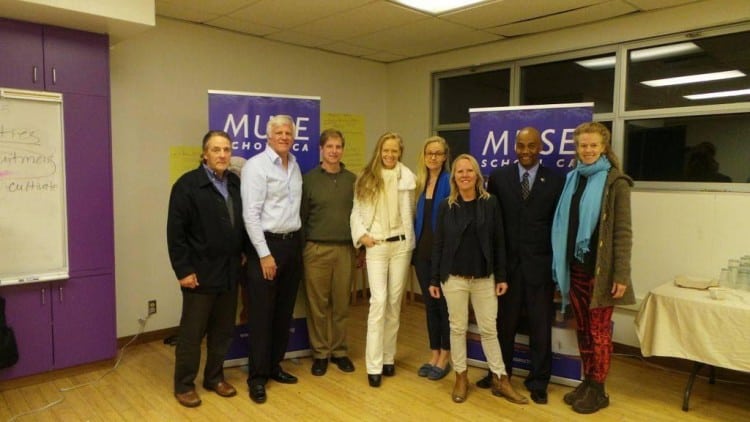

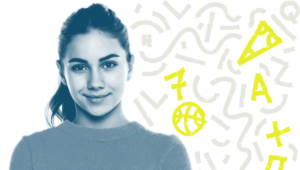
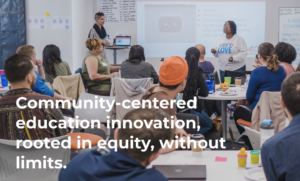

0 Comments
Leave a Comment
Your email address will not be published. All fields are required.